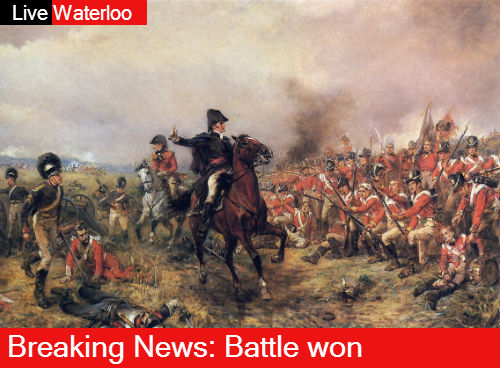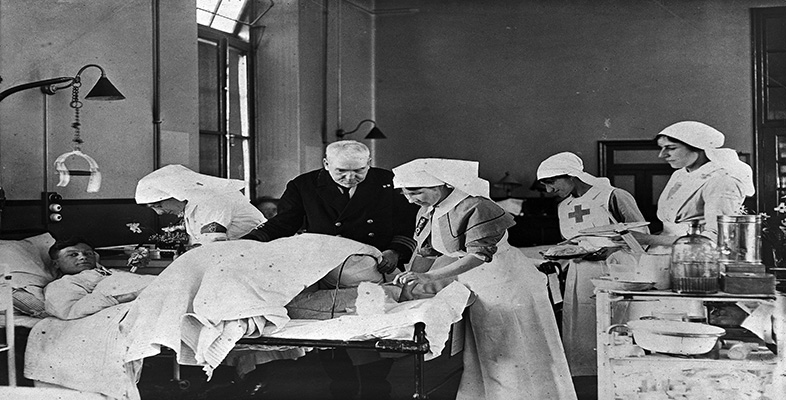Great and glorious news
Annihilation of Bonaparte's whole army, and his own narrow personal escape.
Capture of the traitor's personal staff and carriage,
and
Two hundred and ten pieces of cannon

With hearts gratefully elate and all due thanks to Heaven for the event, we have this day the supreme happiness of announcing one of the most splendid and comprehensive victories ever obtained even by British valour, or the illustrious Wellington himself.
Its consequences we do not hesitate to pronounce completely decisive of the fate of Bonaparte, whose army has been completely overthrown, in a general and most tremendous battle, with the loss of the whole of his artillery, while coward at heart, always principally regardful of his own personal safety, he himself narrowly effected his escape.
The Hon. Major Percy arrived between eleven and twelve o'clock last night, in a post chaise and four, with two of Napoleon's Eagles captured in battle, which were displayed from the windows of the carriage.
He was the bearer of dispatches from the Duke of Wellington, dated Waterloo, the 19th inst, which state, that after the brilliant actions of the 16th and 17th, his gGrace drew up his army in line, which, on the 18th, was attacked with desperate vigour by Bonaparte, with the whole of his force.
The conflict which ensured was long, dreadful and mostly sanguinary, but it gloriously terminated in the complete overthrow of the Tyrant's army, with the loss of two hundred and teh pieces of cannon, 150 by the British and 60 by the Prussian army, the greater part of Bonaparte's baggage, and nearly the whole of his personal Staff.
This much is stated in the dispatches of our illustrious Chief; in addition to which, Major Percy informs that on finding his Army overthrown and all his hopes destroyed, the vanquished Napoleon, who beheld the last desperate efforts of his troops from a scaffolding situated on an eminence, betook himself to rapid flight on horseback, leaving his carriage and nearly the whole of his personal Staff in the possession of the British.
The conflict was of so tremendous a description that few prisoners were made, and the Allied Army was left in pursuit of the shattered remains of the enemy's force, without the slightest prospect of the Tyrant being ever able to rally again, or in any respect to retrieve his fallen fortunes.
What renders this great and splendid achievement all the more gratifying to us, is the proud circumstances of its having been accomplished chiefly by British valour, though every praise is due to the Prussian Chief for his vigorous and cordial co-operation; and under Heaven we trust that the overthrow of the Tyrant, if not already effected, will be accomplished before either the Russian or Austrian armies come up, and without further aid from our Allies.
Britain, therefore may be indeed now truly considered as at the summit of glory.
Having saved herself by her own exertions, she has saved Europe by her example and support, and to her generous and noble sacrifices will Europe and the world be indebted for the overthrow and annihilation of the curse and scourge of the whole race of civilised man.
Colonels Gordon and Canning, belonging to the Duke of Wellington's staff, were both killed, close to the person of that illustrious hero, whose own person, always exposed to the greatest danger, is held sacred by Heaven for the general good of the nations of the earth,
The Park and Tower Guns will be fired at ten o'clock this morning in honour of the splendid event which it is our pride and happiness to have this day to records, and an Extraordinary Gazette will be published before noon.
Major Percy, on his arrival with the Dispatches, first went to Lord Bathurst's Office; but not finding his Lordship there, he proceeded to Lord Harrowby's, in Grosvenor-square, where all the cabinet were assembled, and there delivered the Dispatches and Eagles with which he was entrusted, amidst the universal and extatic cheerings of the populace.
We shall stop the press to give the official particulars of the dispatches.
From The Morning Post, June 22nd, 1815.
(It's interesting that even in the age of courier despatch and print, news reports still ended with the equivalent of a rolling news anchor's promise to "bring you more on this story as we get it...")

Rate and Review
Rate this article
Review this article
Log into OpenLearn to leave reviews and join in the conversation.
Article reviews